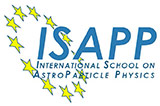Research Training Groups and Graduate Schools
KSETA successful in the first line of funding of the Excellence Initiative II
 The Karlsruhe School of Elementary Particle and Astroparticle Physics: Science and Technology (KSETA) is an essential component of the KIT Center Elementary Particle and Astroparticle Physics (KCETA).
The Karlsruhe School of Elementary Particle and Astroparticle Physics: Science and Technology (KSETA) is an essential component of the KIT Center Elementary Particle and Astroparticle Physics (KCETA).
PhD students from the fields of physics as well as engineering science work together on theoretical investigations and on large experiments regarding questions of basic research as well as the development of modern technologies. They are involved in interdisciplinary global projects, to which KCETA supplies leading-edge contributions. Among others this is the Pierre Auger Observatory for cosmic rays in Argentina, the particle detector CMS at the Large Hadron Collider (LHC) at CERN, the KArlsruhe TRItium Neutrino (KATRIN) experiment, the Alpha Magnetic Spectrometer (AMS) on the International Space Station (ISS) and the underground detector EDELWEISS for the Dark Matter search.
KSETA offers special training, builds bridges between physicists and engineers and thus establishes an excellent basis for joint research.
Spokesperson: Prof. Dr. Ulrich Nierste
Press release ![]()
Graduate Research Training Group GRK 1694
The Graduate Research Training Group GRK 1694 "Elementary particle physics at highest energy and precision" studies experimental and theoretical elementary particle physics at KCETA.
The research areas of the RTG mirror the most recent developments in particle physics. The KIT groups are deeply involved in experiments at the Large Hadron Collider (LHC) at CERN, in Belle in Tsukuba and KATRIN in Karlsruhe. Theoretical work focuses on new methods for higher order corrections in quantum field theory and their application to phenomenological problems, aiming at better predictions of observables within the Standard Model and beyond. A second focal point is the development of Monte Carlo programs.
International networking is intrinsic to research in particle physics and an integral part of this RTG. It builds on experiences gained with the DFG funded RTG GRK 742 "High Energy Physics and Particle Astrophysics" which expired in 2010. The Graduate Research Training Group offers unique opportunities for the education of young scientists at KCETA.
Spokesperson: Prof. Dr. Dieter Zeppenfeld
International School on Astroparticle Physics (ISAPP)
 The European Doctorate School ISAPP consists of a network of European Institutions with the purpose of organizing a common curriculum in Astroparticle Physics at the level of a Doctorate School.
The European Doctorate School ISAPP consists of a network of European Institutions with the purpose of organizing a common curriculum in Astroparticle Physics at the level of a Doctorate School.
On the basis of a common agreement subscribed by the ISAPP institutions, specialized courses concerning Astroparticle Physics are organized in a common International School on AstroParticle Physics (ISAPP). Bilateral and multilateral student exchanges concerning the research activities in this field are also foreseen, in view of their thesis preparation.

